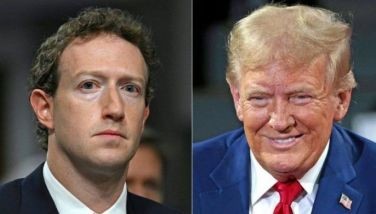Corporate politics

Corporate politics are different from electoral politics. The latter involves the practice of the art of the possible covering such talents as satisfying the feeding frenzy of media, making your enemies seem reasonable, even if misguided, answering questions that have nothing to do with the national budget like who you’re dating, and having your motives for any action questioned and assigned the vilest motives possible, including those you hadn’t even thought of.
Companies, however, cannot escape the effects of political dynamics, even if in a different scale. There is always a sort of political game that is played by companies and those who own and head them. Behind the organizations listed in the stock exchange are powerful individuals who practice the art of power in a different way. Political skills in a different context determine the quality of one’s long-term investment in a particular listed stock. Media too cover titans and their acquisitive natures as well as their rivals with the same zest as they cover political figures.
Still, there are differences in how politics operates within the corporation that sometimes makes the transition from the private to the public sector (and vice versa) full of challenges.
Misdemeanors are swiftly dealt with. There is no need to set up a committee for an incident report to investigate an anomaly and how this can be prevented in the future. It certainly does not take two months for the review and the re-review process to be completed before announcing the underwhelming course of action taken. The offending party is given his walking papers and if there is an explanation that accompanies the departure, it is short and to the point — Mr. X is no longer with the company. This may even be posted in the classified ads section of major dailies with his photo, often unflattering and before he went on an Atkins diet. There are no wringing of hands and protestations of friendships and sharing of some sporting activity. Determining blame and who bears it is a simple matter and swiftly decided. Never mind if the wrong person gets fired, but something is done about it. Eventually the right one gets the axe, even if it’s the CEO.
Media scrutiny is limited. Business executives address a narrower base of interested parties (employees, stockholders, customers, and investors) than politicians (enemies, constituents, and the struggling masses). Thus, media attention on business is narrow since the goings-on in a corporation seldom affect issues that people march in the street for like rising prices, violation of human rights, reproductive health, and relocation of informal settlers. Business stories are comprehensible to only a few even when simplified by business writers and turned into soap opera with heroes and villains. Can you explain a tender offer that has not been extended to minority shareholders and why it is important to anybody else? Seldom do business stories make it to the front page, even if they should.
It’s all right to buy votes. While regular politicians also buy votes, they make sanctimonious declarations to the contrary. It’s acceptable however for a block in a listed company to increase its number of shares and buy them in the open market or from other parties wanting to cash in on the unusual rise in prices of once-slumbering stocks. Not only do corporate types admit to buying votes, they even disclose at what prices these had been bought and how much they now control. Having more votes (or shares) eliminates or reduces the power of the opposition. In corporations, there are no party-list shareholders.
Approval ratings are conducted daily. For a listed company, the approval (or disapproval) rating is reflected in the price of the stock and the volume of its transactions. A stock that is “not liquid” is one that nobody bothers about too much. Its price hardly moves in either direction. For the most part, corporations do not need to wait for a survey company to announce if the public love them.
There are annual elections. While politicians can rest easy and do whatever they do once elected, needing to think about the polls again only after three years, businessmen have to go through voting every year at the stockholders’ meeting. There are also nominations committees and counting of votes where shares are cast for particular individuals who usually get voted as a group. While corporate elections to the board are often a foregone conclusion, they can be exciting when there are blocks of shares vying for supremacy. Even in the latter case, the suspense is over before the announcement is made since the counts depend on shares owned and controlled weeks before the supposed elections.
Constituents can easily bail out. If stockholders are unhappy with the way the CEO is running the company, they can simply sell their shares. Thus a vote of no-confidence is a simple matter of unloading shares of a particular company whose strategy the constituent finds deplorable. If a promised acquisition that will bring up the company’s value does not materialize, the investors simply dump the shares at market and take their losses. There is no need for a privilege speech or a congressional investigation, just an order to the broker or a tap on the computer to “sell at market” and then move on to cash, bonds, time deposits, or the stock of another company.
Certain businesses need political support. There’s no need to seek political connections if one is selling carrot cakes or sandals. It is the customers that determine the fate of these companies. But natural monopolies that require franchises, rate reviews, and occasionally congressional investigations need friends in government. Such capital-intensive enterprises deal with regulatory agencies on a regular basis and have a political dimension that can restrict or enhance profitability. Such companies have a high level of representation expenses.
Given the political dimension of large corporations, it is puzzling that there has not been a successful business candidate for a national position, except at the legislative level. Somehow, the credentials of business success are not seen as proof of political fitness. Given the risk-reward ratio that businessmen are constantly evaluating, it is deemed more appropriate to support (not just in kind words) specific candidates rather than become one of them. This is why survey results are so important for businessmen in allocating funds for the political exercise. This does not include the coming barangay elections.
Corporate politicians do not employ surveys and popularity polls to determine their standing in the corporate world. It is the earnings per share and dividends declared or family connections that serve to keep them in their jobs. It is not necessary for a CEO to smile or even be nice to media. It is his financial performance and market share that win him votes. Thus, corporate politicians rely on verifiable numbers to make their case, not the numbers that attend their rallies.
Still, when the numbers turn red, early retirement “to have more time with the family” or assignment to the holding company to be in charge of “special projects” or pursue strategic alliances (always temporary) can serve as the businessman’s version of political exile.
- Latest
- Trending































